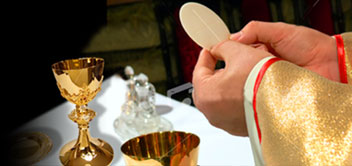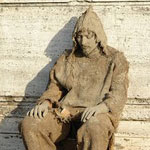Commenters on this blog are allowed to use a pseudonym or remain anonymous, but I do ask for legitimate email addresses.
Yesterday, Jeb Luke Mutters left two comments and a false email address, so I have declined to publish his comments in the pertinent discussion thread.
His first comment is no great loss, anyway. It’s supposed to be a joke I think, but it is not funny, and it is far from edifying.
His second comment, however, is so good that I’m posting it here, despite the false email address. It is not easy reading (though aesthetically it is beautiful poetry), but it is thoughtful and useful reading.
I suspect Jeb Luke is not a priest. No priest would corroborate the prestige and ease he attaches to priestly life. That notwithstanding, there is a lot of truth in these verses. It serves very well as an examination of conscience for priests – or for me, anyway. God forbid I do all of these things all of the time, but God knows I do some of these things some of the time, so there but for the grace of God go I.
I know a priest.
He once left seminary.
He came back because he didn’t own a car.
He hated working for a living.
He hated the idea of being ordinary.
He liked going to his mailbox for donations.
He liked feeling more important than others.
Seminary gave him this.
It wet his appetite for free things.
It made him salivate for human praise.So he lied to himself.
So he lied to his God.
So he lied to his Church.
He murdered his conscience in cold blood.
He became a priest.
He did it for the wrong reasons.
But that was irrelevant to him then.
It’s irrelevant to him now.
On the worst days, he commutes the bad fit to martyrdom.
But that, too, is a lie.Since ordination, he spends much time bragging.
He brags about how much freedom he has.
He brags about how well he lives.
He brags about his education.
He brags about how good it is to be a priest.
But who is he trying to convince?
He talks down to others.
He pretends to be an expert on all matters holy.
But he is not holy.
He is his own Bad Karma.He is marred by immaturity,
He is a teething baby.
He is haunted by his sense of humor,
He misplaces his Celibacy.
But he does not call it “sin.”
He calls it “brokenness.”
He does not call it “sacrilege.”
He calls it his “struggling.”
He does not call it “hypocrisy”
He calls it “being human.”He insulates himself from the truth.
He must.
He insulates himself from who his Christ is.
He must.
He insulates himself from who his parishioners are.
He must.
He insulates himself from who he is.
This scares him most.
So, he preaches like a detuned radio.
He drones his way around epiphanies.This is his plan.
He dismisses the truthful.
He outnumbers them by appearances.
He wears his title like a Hitler-hairdo.
He surrounds himself with the unwise,
the uninformed,
the underdeveloped,
the cliquish,
the equally immature.
These people make him comfortable.He promotes them under himself.
The lowly make him look higher.
The weak make him powerful.
The stupid make him smart.
They make him his own god.
And so he is.
He has attained Enlightenment.
He has entered Nirvana.
Yet, he needs to act badly.
He needs to lose himself.He is frustrated by his priesthood.
He is frustrated by his manhood.
Together, they’re a bad fit.
There’s no escaping them.
So, he does that which makes him less priestly.
He does that which makes him less of a man.
He has to keep them separate.
He has to keep them from touching.
Together, they form a monster.
So he takes great care.He plays with toys.
He looks at pictures.
He carries a hand puppet.
He is its voice.
He tells bad jokes.
He makes a sideshow of his faith,
He makes a circus of his priesthood.
He drowns out Christ with a calliope
This brings him
what he calls peace.If challenged, he fancies himself a martyr.
If applauded, he facies himself a Christ.
But he is nothing like Christ.
He is nothing like the martyrs.
They suffered for truth.
He suffers because of himself.
They spoke wisdom.
He buzzes like a refrigerator.
His truth is what he decides.
He spouts off his faith like a math problem.But it’s simpler than he makes it sound.
Pride is his god.
Selfishness is his teacher.
Opinion is his confessor.
Together, they wash away who he is.
Together, they absolve him of himself.
Together, they anoint the facade he has become.
They are his Holy Trinity.
They are all he needs.
They kill his devil.
I try not to be pessimistic on this blog, so let me counter this illuminating but cynical perspective with another, no less illuminating but much more idealistic:
This, too, serves as a good examination of conscience I think. The first time I watched it, I spontaneously asked myself, how much am I in love with God? Have I allowed myself to fall out of love? How affectionately, and how lovingly, do I pray my mental prayer?
Lent is the ideal time for self-examination and conversion. I wish you’d provided a real email address Jeb Luke, but nonetheless I thank you.






Very beautiful video, unfortunately, there are some priests out there like the one mentioned in the poem. The ideal and the reality can be a stark comparison. Whenever I see a priest in his collar on the street or in a church, I think of a man who has fallen in love with the Lord and of a Lord who has fallen in love with me. I pray for all of priests that they receive ever grace they need and be strengthened in spirit. God bless you, Father.
Bitter and twisted doggerel. Ex-seminarian, I’d say. Check your emails, Father.
Interesting. I was struck by the verse. It contains here and there, just perhaps, a shade of caricature, but on the whole, I think it speaks of an experience; I think it manages to hit more than a nerve or two. Perhaps there is some bitterness felt by the writer – some bitterness comes across – but even if one thinks this, there is a place for this. Bitterness is a very human suffering, that itself arises from suffering. I agree with Father John, that the verse is good, in that it has a strength in its style, it rings as authentic. It tells some truths. It may not be everyone’s experience or hope or fervent wish. But we musn’t dismiss such experience as “twisted”. If we can’t look at ourselves in the mirror and face our failings we have a problem.
No, I don’t think we can or should call it twisted, nor the product of what, unfortunately, some people derided in the past as a ‘failed vocation” when they referred to those who left a seminary before ordination: a very unhelpful and unhealthy attitude indeed. (And misdirected in any case, considering every ordained secular priest is an ex-seminarian as well.)
One of the things you learn if you do spend time in a seminary is that seminarians and priests are pretty ordinary and just as human, fallible and peccable as yourself. Hopefully, the system and the expectations of other people won’t go to their heads and make them unbearable or monsters, as no doubt happens more frequently than one might like. The priest in the writer’s verse is a sorry figure, all things considered, but he represents more than just a cautionary tale or a frivolous resentment.
We should be grateful if we meet someone we can like and get a bit motivated by.